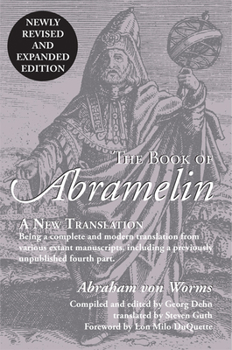The Book of Abramelin: A New Translation - Revised and Expanded
Select Format
Select Condition 
Book Overview
This is a new and expanded second edition of The Book of Abramelin , a modern classic of Magic since it was first published in English by Ibis Press in 2006. The new material includes copious footnotes and an extensive index. It is the first modern translation of this critical magical work since S.L. Macgregor Mathers's original translation over 100 years ago. Not only is the language updated, but Georg Dehn, the compiler and editor, has sourced his work from all extant manuscripts, whereas Mathers used just one. The result is a stunning new translation, which has already set the occult world abuzz.
Format:Hardcover
Language:English
ISBN:0892542144
ISBN13:9780892542147
Release Date:August 2015
Publisher:Ibis Press
Length:304 Pages
Weight:1.75 lbs.
Dimensions:1.2" x 6.2" x 9.3"
Customer Reviews
1 rating
The Teacher Has Appeared!
Published by Thriftbooks.com User , 24 years ago
I must first reject opinions that this book isn't for the beginner. I wish that I had such useful instruction when I began. Abramelin, through the wise scholarship of Abraham of Wertzburg, sets down the ground rules for the pious scholar who wishes to learn true magic(k) and not be drawn into the traps of the unrighteous.... The translation is not without its errors, though. For instance, Mathers translates what I believe was "creator" as "architect of the universe," a cleary masonic term. Also, although the day was divided into two 12-hour increments since Egyptian times, the term "o'clock" could not have been a proper term in the 1460's. Most of the book is obvioulsy trasnlated from old French, and not Hebrew as Mathers claims (for marketing reasons). I must disagree with Crowley, however, who blamed his initial lack of success with this book on its translator. Abraham insists on periods of prayer, meditation, and yes, celibacy before attempting any feat-- a regiment the undisciplined Crowley could clearly not stick to. The scholar who wishes to learn and practice magic-- not false concepts of astrology, numerology, and the tricks of charlatans-- should read and study this as their first real instruction. This is truly the one book that any magus cannot live without.






